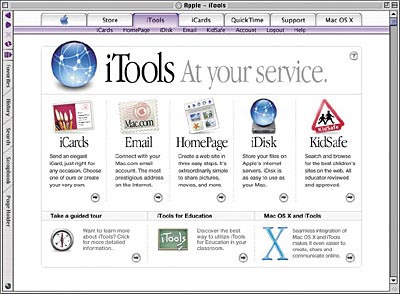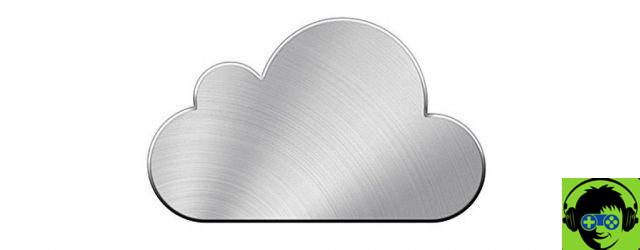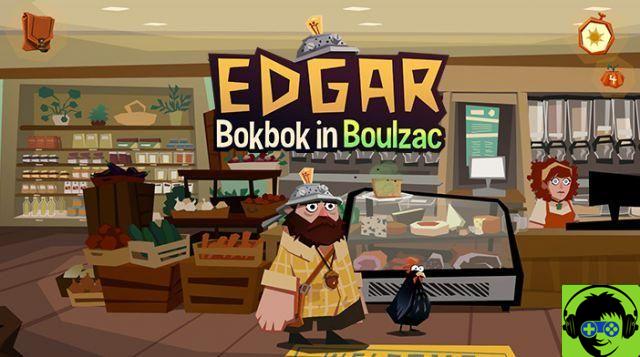For many, they may not even know what it is, but if you do, it means that you have been in the Apple world since - at least - since 2000. For many, giving the email.mac account is not just a matter of its own. time has become our favorite mailbox, but it also somehow says something about us… even if only we know what it means.
A keepsake for iTools
iTools was a set of Internet software and services created by Apple and released on January 5, 2000. They were free for Mac users.

ITools services included a @ mac.com email account (which could only be used via an email client), iCards (a free e-postcard service), iReview (a collection of reviews of sites and pages on the Internet), Homepage (a free program for creating web pages), iDisk (un cloud storage) e KidSafe (a directory of pages suitable for children and families).
Of all of them, only a few have left their mark on the public. The email.mac account, as we say, was an instant hit, being adopted massively by Apple users, iCard was also a widely used resource, and HomePage was exactly the kind of application you expected from Apple, simple, effective and which delivered exactly what it promised. iDisk was a good idea, but slow and unreliable.
Of course, the "internet" was growing much faster than Apple could comprehend and services like KidSafe or iReview were quickly forgotten. Other e-mail providers, such as Google with Gmail, launched in 2004, have evolved services and features far beyond what Apple offered and all cloud services have caught Apple "in the clouds", thinking they are a hardware accessory, not a whole category in itself. It would take Apple many years to catch up with "cloud" services.
Renamed. Mac
The success of @mac mail accounts and the use of iDisk meant that only two years later the iTools were renamed.Mac and became paid (we have already discussed here the problems Apple has with "free"). It was announced on July 17, 2002, just two years after iTools appeared.
This caused a revolution among users who refused to accept payment for something that was previously free.
.Mac offered several tools to subscribers, such as HomePage updates, iDisk, @ mac.com, incorporated the IMAP protocol as well as POP and iCard. Furthermore, Backup services have been incorporated into .Mac, a solution for making backup copies on iDisk, CD or DVD; and McAfee Virex, an antivirus.
In addition, Apple has periodically provided "gifts" to subscribers such as music wallpapers, games, and so on. which could be inside the iDisk and downloaded to your computer.
The MobileMe Catastrophe

On June 9, 2008, Apple announced that Mac would be renamed MobileMe. The domain that email accounts would use would be @ me.com. Not only was the name meaningless to users, who fully identified with an @ mac.com email address, but the change was for the worse.
The change of domain on me.com has been unstable and unreliable for a long time. In addition, "taking advantage" of the change, Apple removed some of the more familiar services for users, such as iCard, web-based access to bookmarks, slides.Mac and groups.Mac (forums).
As reported by Fortune magazine in May 2011, in the summer of 2008, faced with persistent negative reviews from MobileMe, Steve Jobs summoned the MobileMe team to the City Hall auditorium at Infinite Loop 4. When he asked attendees «¿¿ What should MobileMe do? And hearing the response, Jobs replied, “so why the fuck doesn't he? "
iCloud

On June 6, 2011, at WWDC 2011, the launch of iCloud was announced in Fall 2011, completely replacing MobileMe. Accounts that started as @ mac.com, later became @ me.com, will now be @ iCloud.com.
On June 30, 2012, Apple deleted all traces of MobileMe from its servers, including user files.
For context, iPhone 4s and iOS 5 were introduced that same year, meaning Apple was already a money making machine.
The salad from Apple's mail service
The result is that "the oldest in the place", we can send and receive emails from @mac, @me or @icloud and they all leave and arrive at the same mailbox. Sometimes I think I should also make the switch to iCloud, because every day Apple will release a document saying @mac accounts will stop working and the change will be traumatic.
But I can't, @mac email accounts remind me of that effervescence, that optimism of the good old days of Apple, where innovation, the desire to try new things (even if it was wrong as with MobileMe) was something of all. days. Apple might surprise you.
I'm not saying you don't innovate today. Innovation at Apple continues to skyrocket, and every iPhone, every Apple Watch, every version of Final Cut Pro, is brimming with innovation and improvements over what we know.
What perhaps is missing at this time is surprise. We know there will be new iPhones, new iPads, new watches, maybe even new AirPods. But it's been a long time since I've heard "wow, I didn't see this coming," where Apple dribbles by suddenly changing direction and marching in a different direction than it seemed.
And of course, even if they say no, that nothing has changed, what has disappeared since that moment is the customer (the maquero, the user) from the center of the company. Now you have to try not to break anything. And it's possible - as rumored - that the next iPhone (or the next) won't include a charger or headphones, but that won't be because the customer is the focus. It will be because it is necessary to protect the margins in order to continue selling at the rate at which one sells.
And maybe that's why, in the 21st century, I still use the @mac account. You use it?










![Interview with Tom Hanks [Update I and II]](/images/posts/3a79ddab0e3f62d2832d74af31daff7b-0.jpg)















